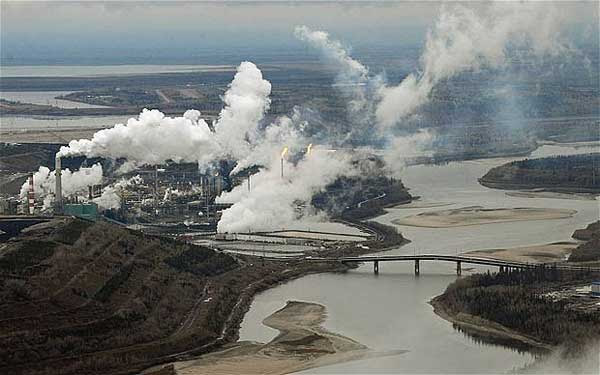| ||||
|

Profiting From Pollution in the Alberta Oil Sands
Elizabeth Nussbaumer: Offsets and the added profit from repurposed pollution perpetuate and further engrain the trend of polluting with impunity by using energy sources that only take us backwards.
The New Face of Green Energy: Profiting From Pollution in the Alberta Oil Sands
First, offsets of any kind are a shell game. They allow a polluter to purchase emissions reduction credits instead of reducing their own emissions at the source. In the United States, for example, an oil refinery in California is allowed to meet a portion of its required emissions reductions by purchasing offsets from a landowner in Arkansas who has agreed to not cut down the forest on their land. Cutting down trees releases CO2 emissions, so the act of refraining from cutting them down counts as an “avoided emission,” and can be sold as an offset.
Second, a closer look at the origins of the waste gas Genalta uses to generate electricity reveals a dubious backstory. The waste gas comes from oil and bitumen extraction in the Alberta oil sands. According to the Calgary Herald, natural gas produced as part of oil and bitumen production has previously been flared or vented, “due to poor economics and distances from gathering pipelines that makes conservation of the gas impossible.”
The real story here is that Genalta developed technology to use natural gas that was previously discarded because of a lack of necessary infrastructure. It’s more than a stretch to spin this as providing “environmentally-friendly electricity from alternative energy sources.” It’s just more dirty energy from incredibly dirty sources.
As a result, Genalta can now divert gas from flaring and convert it into electricity. By not flaring the gas they receive offset credits for “avoided emissions,” which can be sold to another company to offset their continued emissions. In addition, the power generated from this salvaged waste gas is sold to utilities or used to decrease on-site costs. A previously unprofitable “waste gas” now supports two new revenue streams that only exist because of highly polluting fossil fuel exploitation occurring in the Alberta oil sands.
Offsets and the added profit from repurposed pollution perpetuate and further engrain the trend of polluting with impunity by using energy sources that only take us backwards in our need to address growing pollution debts.
Offsets and the added profit from repurposed pollution perpetuate and further engrain the trend of polluting with impunity by using energy sources that only take us backwards in our need to address growing pollution debts.
The Athabasca oil sands, also known as the tar sands or Alberta oil sands, occupy a large portion of northeastern Alberta and consist of large deposits of bitumen, a form of very heavy crude oil — one of the dirtiest around and as thick as peanut butter, requiring toxic chemicals to dilute it for transport through pipelines. This is what would fill the Keystone XL Pipeline if it ever gets built.
This past July a report came out showing initial links between the tar sands and an emerging cancer cluster in Fort Chipewyan, Alberta. The study found that wildlife in the area, which is a common source of food for residents, had high levels of arsenic and mercury among other heavy metals.
It’s appalling that Genalta describes itself as producing and selling “environmentally-friendly electricity from alternative energy sources.” Not a single part of this initiative is environmentally friendly — the waste gas used comes from an indisputably harmful process of fossil fuel extraction, and the process of converting the waste gas into usable electricity still creates emissions. Natural gas is not an alternative energy source, either. It’s just as much of a fossil fuel as the oil and bitumen extracted from the Alberta oil sands.
The technology and infrastructure developed by Genalta has created not one, but two ways to profit off of the pollution byproducts of Alberta oil sands extraction. Offsets already create a way to pay to keep on polluting, and now companies can further profit from repurposed pollution. This practice does not stop fossil fuel use or the reckless trashing of our environment, and it doesn’t address the critical risks we face from climate change.
Elizabeth Nussbaumer
Food & Water Watch
Food & Water Watch





 ;
;